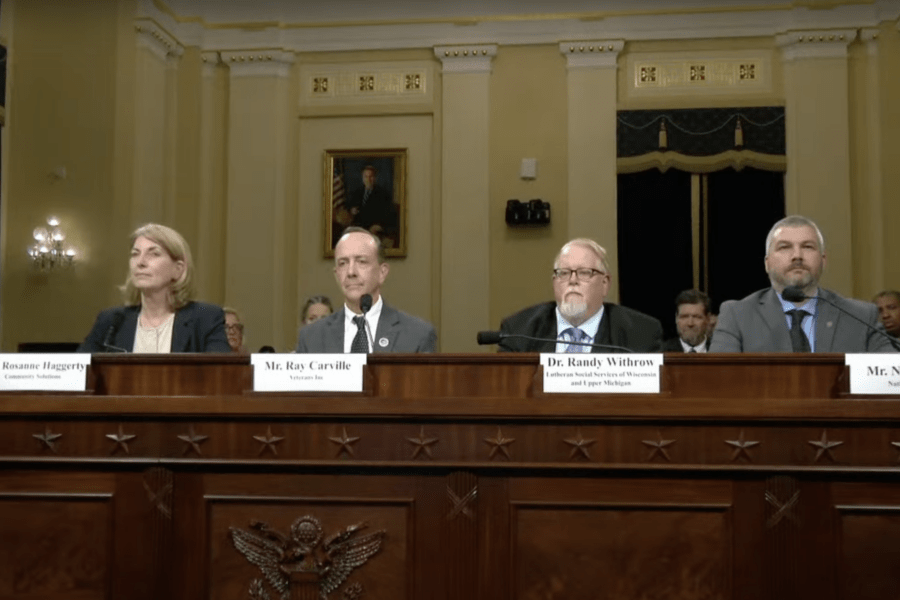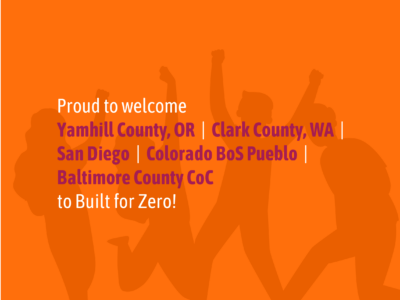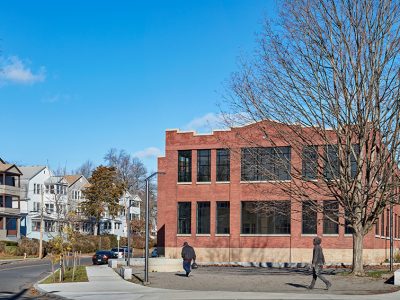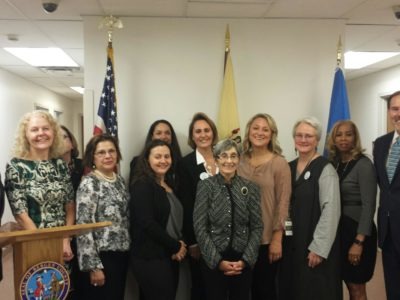“Real time, by-name data is a game changer for every type of community working to end veteran homelessness.”
Rosanne Haggerty, CEO and President of Community Solutions, shared this statement during a June 27, 2024, hearing before the House Committee on Veterans’ Affairs Subcommittee on Economic Opportunity. Haggerty joined Veterans Inc Public Affairs Manager Ray Carville; Lutheran Social Services of Wisconsin and Upper Michigan Site Director Dr. Randy Withrow (on behalf of Veterans Housing and Recovery Program); and Nation’s Finest Regional Site Director Nick Wood to testify on data-driven methods to reduce veteran homelessness.
Haggerty was invited to speak about the importance of by-name data. She shared successes seen in communities utilizing data and suggested policy changes to help more communities harness the power of data to confidently identify and assist every person experiencing homelessness.
We’re thankful for the opportunity to share findings and recommendations with the committee and we look forward to continue working together to make homelessness rare and brief.
Read Rosanne’s full remarks
“Chairman Van Orden, Ranking Member Levin, distinguished members of the Subcommittee, ladies and gentlemen, thank you for the opportunity to testify today on the critical issue of ending Veteran homelessness. My name is Rosanne Haggerty, I am the President and Chief Executive Officer of Community Solutions.
First, I would like to acknowledge the tremendous progress that the Department of Veterans Affairs (VA) has made in reducing Veteran homelessness. I especially want to recognize the adoption of the One Team approach, which involves coordinated actions and program interconnections aimed at ending Veteran homelessness and provides Veterans, regardless of their entry point, with a holistic housing and service plan tailored to their personal choices. Community Solutions is honored to work with the VA and community partners throughout the country toward our joint mission of ending Veteran homelessness and seeing that all Veterans receive the help they need to live with dignity. Additionally, I want to extend my thanks to the Department of Housing and Urban Development (HUD) and the United States Interagency Council on Homelessness (USICH) for their tireless work in this critical effort.
Community Solutions is a national non-profit organization working toward a lasting end to homelessness. We support a network of more than 140 US communities of all sizes, rural, urban, and suburban across 38 states as well as with more than 70 international communities in five countries outside the US. Our aim is to reach a tipping point where homelessness is understood as solvable, progress is expected, and a critical mass of communities are achieving measurable reductions by the end of 2026. Working with communities, we provide the backbone support for an initiative called Built for Zero (BfZ). BfZ uses a rigorous, data-driven methodology to help communities change how local
homeless response systems work and the impact they can achieve toward making homelessness rare and brief. BfZ communities create a unified, multi-agency team focused on that goal and collaborate to create and work from a comprehensive, by name, real time operating awareness of each person experiencing homelessness in their area.
This shared view of the dynamics of homelessness enables communities to align their efforts and resources to achieve measurable results. Local teams are able to see what’s working to reduce homelessness and quickly detect when shifts in strategy are needed. These coordinated teams can target interventions to improve individual outcomes while creating a high performing local prevention and response system to make homelessness itself increasingly rare and brief.
Quality data is the key to the BfZ methodology; quite simply, communities identify every individual experiencing homelessness by name. Privacy is protected through formal releases of information and strict access protocols. Local teams continually update this information at least monthly. This common operating picture enables each individual to benefit from the full array of local resources to overcome their homelessness, and enables the community team to understand and respond quickly to trends and opportunities to accelerate overall progress.
Real-time, by-name data has proven to be a game changer for every type of community working to end Veteran homelessness. It focuses front line workers from multiple organizations on the individual Veteran and how best to serve him or her. It gives these workers, whether from the VA, local homeless services or the housing authority the timely information needed to diagnose individual and system challenges, to problem solve, coordinate services, track progress and course correct as needed. It gives local system leaders and policy makers the actionable information they need to know what’s working or and where things are stuck. This real time data reporting also enables teams to test ideas, innovate, and apply practices like continuous quality improvement needed to achieve measurable results. Communities that utilize by-name data demonstrate the power of precise, up-to-date information to enable significant progress.
Currently, over 80 communities within the Built for Zero network are focused on reducing Veteran homelessness. Of these, 45 communities have seen measurable reductions and among these, 12 communities have made Veteran homelessness rare and brief.
These local teams are demonstrating that the foundational elements for reducing Veteran homelessness are a unified team and knowing every Veteran experiencing homelessness in their community by-name in real time.
We see this in communities of all sizes and types that have successfully adopted the use of quality real-time data. For instance, Chattanooga and Central Tennessee have made Veteran homelessness rare and brief. Gulf Coast, Mississippi, can rehouse any Veteran who
becomes homeless within 11 days. Detroit, Michigan has reduced Veteran homelessness by 50%, leveraging data to coordinate services and expedite housing placements. Similarly, Metro Denver has reduced Veteran homelessness by 30%. The Twin Cities have reduced Veteran homelessness by 24%. In Charlotte, North Carolina, efforts toward quality data on Veterans have led to making de-identified data available to the public to galvanize local support for ending Veteran homelessness. These examples illustrate the power of quality real-time data to drive measurable reductions in Veteran homelessness across diverse communities.
The tenaciousness of these communities to shift to a team based approach to ending Veteran homelessness and develop quality data highlights the potential for accelerating progress nationally in reducing Veteran and all homelessness. This level of local collaboration and individual level awareness may have other impacts. For example, improved collaboration and data may allow for quicker and more precise identification of Veterans at risk of suicide. By identifying Veterans who are struggling, community teams can connect them with critical resources and support before they reach a crisis point.
Our vision is that every community in the United States, regardless of size or resources, can leverage data to its fullest potential to confidently identify and assist every person experiencing homelessness. This approach not only benefits individuals in housing crises but enables local teams to identify bottlenecks, optimize their resources and respond swiftly to emerging trends to reduce homelessness overall.
To harness the potential of quality data, we recommend several policy changes:
1. Adopt the use of By-Name Data to drive reductions in Veteran homelessness. Reconfigure systems, including the already strong HOMES data system to adopt a by-name data model. This approach allows for personalized tracking of each Veteran, facilitates targeted coordination of services such as through the One Team model being used by the VA, and accelerates their path to a stable home.
2. Shift data standards to rely on regularly collected and reported real-time data. Once aggregated and de-identified, use current data as the primary performance indicator for progress in addressing Veteran homelessness. It provides a continuous and therefore more accurate picture of Veteran homelessness and allows for timely and targeted interventions to ensure no Veteran is left behind.
3. Enhance VA and community data sharing for homeless Veterans. The federal government can enhance data sharing between the VA and community partners providing services for homeless Veterans. Cleland Dole Section 309 mandates that the Secretary of Veterans Affairs and the Secretary of Housing and Urban Development collaboratively develop a system for effective data sharing and reporting between the community-wide Homeless Management Information
System (HMIS), as defined in the McKinney-Vento Homeless Assistance Act, and the VA’s Homeless Operations Management and Evaluation System (HOMES) (Cleland Dole Section 309, H.R. 2617, 117th Congress). This system, which must be operational by the end of 2025, aims to improve service coordination and support for homeless Veterans by securely integrating these data systems, thereby enhancing personalized and expedited care. Adopting a by-name data methodology for Veterans’ homelessness will further personalize and expedite care, ensuring Veterans receive the timely and individualized support they need. Strengthening these data-sharing practices will enhance Veterans’ access to essential services.
These policies can enhance the effectiveness of local housing systems and help make homelessness for Veterans across the nation rare and brief. Community Solutions is proud to support the VA, HUD, and USICH and our community partners in these efforts to help end Veteran homelessness once and for all.
We have attached additional information to our written testimony, providing detailed insights into the impact of real-time, by-name data and how it is being utilized by communities across the country to drive reductions in homelessness. This includes a comprehensive breakdown of our approach to data modernization as a tool to end homelessness, along with a PowerPoint presentation on Built for Zero’s approach to quality data.”





